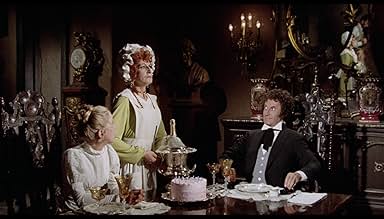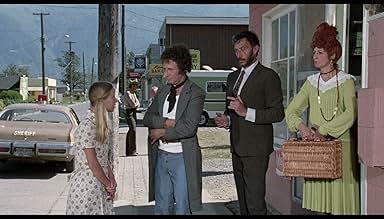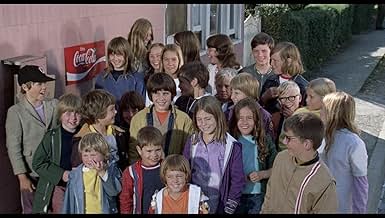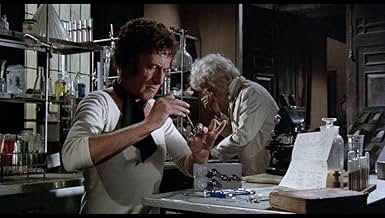Un titiritero mudo utiliza el invento de un científico fallecido para controlar cadáveres como si fueran marionetas.Un titiritero mudo utiliza el invento de un científico fallecido para controlar cadáveres como si fueran marionetas.Un titiritero mudo utiliza el invento de un científico fallecido para controlar cadáveres como si fueran marionetas.
- Nominado a 1 premio Óscar
- 1 nominación en total
- Dirección
- Guionista
- Todo el elenco y el equipo
- Producción, taquilla y más en IMDbPro
Opiniones destacadas
Shanks (1974)
*** (out of 4)
Leave it to William Castle, the ultimate trick master, to save his strangest film for last but that's pretty much what he's done with SHANKS. In the film, Marcel Marceau plays a deaf puppet master who takes over for his scientist friend in a bizarre experiment that allows one to control the dead like you would a puppet. Soon the once abused man becomes in control of everything he's ever wanted. This is a pretty bizarre little movie and I can't imagine it being a big disaster when originally released because it's doubtful too many horror fans wanted to see a horror movie without any violence, blood, spooks or anything like that. Instead of going for cheap thrills, Castle has instead pretty much created a film that is all atmosphere and there's so little dialogue that one could nearly call this a silent film. We even get title cards to explain some of the action so it's extremely close to being a silent. Castle's direction handles the material incredibly well and I'd probably argue that this is perhaps his best made movie. There aren't any gimmicks or tricks being thrown out and instead Castle appears to be wanting to prove to critics that he was able of creating a movie without them. The atmosphere of the film is incredibly thick as it really does seem like you're watching something that doesn't take place on Earth or set during any particular time period. Famous mime Marceau is excellent in his role and really delivers a remarkable performance. His turn at playing this mute is without question one of the best I've seen from any actor as he doesn't have one false step and there's never a single second where it seems like we're just seeing an actor play a deaf man. Tsilla Chelton and Philippe Clay are also excellent especially when they're the "puppets" as it was quite amazing to watch them do their thing. The cute Cindy Eilbacher is the perfect mix to be a friend to Marceau. This isn't a very well known movie, which is a shame but part of this might be due to the fact that it has yet to ever get an official release. Hopefully one day it will get a wider release and people will give the film a second shot because it certainly deserves it and I can't help but think had it been made somewhere between the 40s and the 60s then it would be looked at as a minor classic. Being lost in the 70s, the film is in major need of rediscovery.
*** (out of 4)
Leave it to William Castle, the ultimate trick master, to save his strangest film for last but that's pretty much what he's done with SHANKS. In the film, Marcel Marceau plays a deaf puppet master who takes over for his scientist friend in a bizarre experiment that allows one to control the dead like you would a puppet. Soon the once abused man becomes in control of everything he's ever wanted. This is a pretty bizarre little movie and I can't imagine it being a big disaster when originally released because it's doubtful too many horror fans wanted to see a horror movie without any violence, blood, spooks or anything like that. Instead of going for cheap thrills, Castle has instead pretty much created a film that is all atmosphere and there's so little dialogue that one could nearly call this a silent film. We even get title cards to explain some of the action so it's extremely close to being a silent. Castle's direction handles the material incredibly well and I'd probably argue that this is perhaps his best made movie. There aren't any gimmicks or tricks being thrown out and instead Castle appears to be wanting to prove to critics that he was able of creating a movie without them. The atmosphere of the film is incredibly thick as it really does seem like you're watching something that doesn't take place on Earth or set during any particular time period. Famous mime Marceau is excellent in his role and really delivers a remarkable performance. His turn at playing this mute is without question one of the best I've seen from any actor as he doesn't have one false step and there's never a single second where it seems like we're just seeing an actor play a deaf man. Tsilla Chelton and Philippe Clay are also excellent especially when they're the "puppets" as it was quite amazing to watch them do their thing. The cute Cindy Eilbacher is the perfect mix to be a friend to Marceau. This isn't a very well known movie, which is a shame but part of this might be due to the fact that it has yet to ever get an official release. Hopefully one day it will get a wider release and people will give the film a second shot because it certainly deserves it and I can't help but think had it been made somewhere between the 40s and the 60s then it would be looked at as a minor classic. Being lost in the 70s, the film is in major need of rediscovery.
And that's not an exaggeration. I searched for this movie for a long time, and I'm glad I found it. Marcel Marceau plays Shanks, a deaf puppet maker, and Walker, an old scientist who has discovered the secret of reanimating the dead. He plays both beautifully, using his pantomime skills to achieve silent movie style acting. In fact, that's what this movie reminds me of - a silent fairy tale (the use of title cards to introduce scenes further suggests this), with a little George Romero thrown in! It's incredible that something this abstract and individualistic was made; I wish more movies would be as bold. The opening credits sequence, with tinted photos of kids watching Shanks' puppet show while the weird Oscar nominated (!) music plays is incredibly strange, memorable, and disturbing.
William Castle, of all people, directed. This movie shows, more than any other, that he was more than just the "King of Gimmicks". To see such an expressionistic and disturbing vision.......is to regret that this was his final film as director.
William Castle, of all people, directed. This movie shows, more than any other, that he was more than just the "King of Gimmicks". To see such an expressionistic and disturbing vision.......is to regret that this was his final film as director.
This must surely be one of the most neglected fantasy films of all time. By all accounts a flop at the time of it's release, it has become the hardest to see of all William Castle's movies. It's also in colour, which is another rarity from this director. French mime/actor Marcel Marceau plays the title role of Malcolm Shanks, a deaf mute puppeteer who scratches out a living putting on shows for children, while bearing the brunt of a miserable home life with his money grabbing brother and sister-in-law, who take all the money he earns for themselves. One day, an elderly professor (also played by Marceau in a dual role) sees his puppet show and offers Shanks a job - to come to his home to assist him is some experiments involving the artificial stimulation of dead animals via electricity, or something...why or how it actually works is not expanded on, but it involves small implants being attached to the muscles and these are then activated by means of a small control box.
Due to his background with puppets, Shanks proves to be very adept at controlling the movement of his first animals (a dead frog, and later a rooster). However things take an unexpected turn when he turns up for work one day only to find the professor dead in his armchair, seemingly from natural causes. Shanks has all but been hounded out of his own home by his cruel relatives, and he realises that desperate measures are needed to avoid going back there...and so the professor becomes the first human subject for re-animation.
What follows is the beginning of a macabre and dreamlike fantasy. The "awakening" of the dead professor is one of the most ghoulish things I have ever seen. Marceau is famous as a physical performer, and his depiction of a dead body being artificially roused into movement is very skillful. With a shock of white hair, sunken face and glazed white eyeballs, the professor's body jerks up off the ground and begins to wobble around the laboratory, as Shanks perfects his manipulation of the control box. It isn't long before he feels confident enough to take his new puppet on a stroll into the streets outside, and this is the start of an escalation of events that you really need to watch to get the full enjoyment out of.
This is almost a silent movie for much of it's running time, with long scenes involving no dialogue whatsoever, but the film is so effective in holding your attention that you will barely even notice the fact that nobody is talking. Shanks himself never speaks at all, but the support character all talk naturally when required - except for when they are dead of course! And some rather charming silent movie-style subtitle boards on the screen fill in any required exposition. The acting in this film is amazing, I suspect that Marceau is not the only performer to have a background in mime or theatre, as when he has to animate other dead characters, the movements are always effectively creepy.
If I have any criticism, it would be that Castle - as he has often done before - stays shy of making the film as truly horrific as it could have been. He never exploits the "yuk" factor of the dead bodies, and there is no allusion to bloodshed or decomposition at any time. William Castle is an oddity among horror directors in that he always puts on the brakes before his subject matter goes to deep into unpleasant territory, whereas others would gleefully revel in the more gruesome aspects of a story like this, Castle seems to prefer to keep things suitable for family viewing! Plus, the movie even ends with a tacked on "it's only make-believe" epilogue that completely squashes the very dark ending of the real story...it's something he has done before, and it seems a shame that the films of William Castle are often sabotaged from being truly horror by the directors very own sensibilities.
That notwithstanding, I would call "Shanks" a success, as it holds your attention constantly throughout. If any one thinks Marcel Marceau's talents end with a white made-up face and leotard, they should see him in this...he is perfect for the part, effective in bringing his whole character to life without speaking a single word. The film is a true oddity, but almost impossible to classify. Ultimately, it's just a unique and bewildering experience, and I think everyone should see it.
Due to his background with puppets, Shanks proves to be very adept at controlling the movement of his first animals (a dead frog, and later a rooster). However things take an unexpected turn when he turns up for work one day only to find the professor dead in his armchair, seemingly from natural causes. Shanks has all but been hounded out of his own home by his cruel relatives, and he realises that desperate measures are needed to avoid going back there...and so the professor becomes the first human subject for re-animation.
What follows is the beginning of a macabre and dreamlike fantasy. The "awakening" of the dead professor is one of the most ghoulish things I have ever seen. Marceau is famous as a physical performer, and his depiction of a dead body being artificially roused into movement is very skillful. With a shock of white hair, sunken face and glazed white eyeballs, the professor's body jerks up off the ground and begins to wobble around the laboratory, as Shanks perfects his manipulation of the control box. It isn't long before he feels confident enough to take his new puppet on a stroll into the streets outside, and this is the start of an escalation of events that you really need to watch to get the full enjoyment out of.
This is almost a silent movie for much of it's running time, with long scenes involving no dialogue whatsoever, but the film is so effective in holding your attention that you will barely even notice the fact that nobody is talking. Shanks himself never speaks at all, but the support character all talk naturally when required - except for when they are dead of course! And some rather charming silent movie-style subtitle boards on the screen fill in any required exposition. The acting in this film is amazing, I suspect that Marceau is not the only performer to have a background in mime or theatre, as when he has to animate other dead characters, the movements are always effectively creepy.
If I have any criticism, it would be that Castle - as he has often done before - stays shy of making the film as truly horrific as it could have been. He never exploits the "yuk" factor of the dead bodies, and there is no allusion to bloodshed or decomposition at any time. William Castle is an oddity among horror directors in that he always puts on the brakes before his subject matter goes to deep into unpleasant territory, whereas others would gleefully revel in the more gruesome aspects of a story like this, Castle seems to prefer to keep things suitable for family viewing! Plus, the movie even ends with a tacked on "it's only make-believe" epilogue that completely squashes the very dark ending of the real story...it's something he has done before, and it seems a shame that the films of William Castle are often sabotaged from being truly horror by the directors very own sensibilities.
That notwithstanding, I would call "Shanks" a success, as it holds your attention constantly throughout. If any one thinks Marcel Marceau's talents end with a white made-up face and leotard, they should see him in this...he is perfect for the part, effective in bringing his whole character to life without speaking a single word. The film is a true oddity, but almost impossible to classify. Ultimately, it's just a unique and bewildering experience, and I think everyone should see it.
Shanks is the final film of director William Castle; a man famous for his gimmicky horror films. This film breaks away from many norms and that has lead to it being called 'weird' by many that have seen it - but to me, this is Castle doing what he always does, namely making a film full of gimmicks...only this time the gimmicks don't work so well and the film is not much better than passable. Apparently Castle was going for a sort of grim fairy tale feel; but unfortunately he wasn't able to capture it, partly due to some truly lacklustre performances, but also because of the dull script and plotting. The film focuses on Malcolm Shanks; a deaf and mute puppeteer who lives with his sister and her boyfriend who abuse him. He is forced to get a job, and finds one with a mad doctor who is doing experiments on the dead in which he attempts to bring them back to life. Our hero's job is to move the corpses like he does his puppets. However, when the doctor turns up dead; the puppeteer seeks revenge on those he dislikes.
The first gimmick featured is the casting of the central character - Marcel Marceau, a famous mime. Secondly, Castle tells his story via the use of storyboards which gives the film a silent movie type atmosphere. This fits the central character as he's a mute and thus doesn't speak; but it doesn't really serve any relevance to plot and feels like weirdness simply for the sake of it. The lead character is also really difficult to get into, which is a huge flaw because the plot isn't nearly interesting enough to carry the film on its own. The idea of reanimating the dead is about as morbid as it gets; but it's all done in a kind of pantomime fashion and this saps all the horror from the story; leaving the audience with nothing much to do other than roll their eyes at most scenes. The film is very difficult to find (unsurprisingly it hasn't been given a wide release like most of Castle's oeuvre) and I'm not really surprised at that. I can give plaudits to the film for some of the ideas on display, the originality and the score which is excellent; but really this is far too uneven to be successful and I can't say it's really worth going to the trouble of tracking down.
The first gimmick featured is the casting of the central character - Marcel Marceau, a famous mime. Secondly, Castle tells his story via the use of storyboards which gives the film a silent movie type atmosphere. This fits the central character as he's a mute and thus doesn't speak; but it doesn't really serve any relevance to plot and feels like weirdness simply for the sake of it. The lead character is also really difficult to get into, which is a huge flaw because the plot isn't nearly interesting enough to carry the film on its own. The idea of reanimating the dead is about as morbid as it gets; but it's all done in a kind of pantomime fashion and this saps all the horror from the story; leaving the audience with nothing much to do other than roll their eyes at most scenes. The film is very difficult to find (unsurprisingly it hasn't been given a wide release like most of Castle's oeuvre) and I'm not really surprised at that. I can give plaudits to the film for some of the ideas on display, the originality and the score which is excellent; but really this is far too uneven to be successful and I can't say it's really worth going to the trouble of tracking down.
Here is a film I had wanted to see for some time and finally tracked down a low-quality bootleg video of. I am quite a fan of unusual films like this, although unlike the works of David Lynch or Alejandro Jodorowsky, the weirdness of this film comes naturally from the storyline and not from any intentional strangeness just for the sake of strangeness. William Castle has created a neat, compact, self-contained movie universe here, with the setting being an odd juxtaposition between a dark Gothic castle and sunny Northern California. I couldn't help but be reminded of Tim Burton's "Edward Scissorhands", another modern fairy tale about a mad but gentle genius and his near-mute misfit assistant in a dark old castle surrounded by a sunny '50s style suburbia. In fact, call me crazy, but I will bet that Burton has seen this film before and was possibly inspired by it while making his own film. There are other similarities to that film: the genius dies leaving the misfit to fend for himself in the outside world, the villains are in a motorcycle gang, the misfit falls for a local blond teenage girl, and he also performs his "magic" for children in a school classroom. Also like the films of Burton, there is a mixture of visual motifs from the past and present, including silent-movie style story-cards, Alex North's heady music score, and a motorcycle gang.
Sadly missing, though, is a highly compelling storyline, but in this case style over substance is not such a bad thing. This film is hard to classify, as it is not completely horror, modern fairy tale, or art film. I think it would be best to classify it as an experimental curio - one of those films like "Eraserhead", Jacques Tati's "Playtime", "Cabinet of Dr. Caligaryi", or "El Topo", which have no conventional film equivalent yet continue to garner a following from a small group of adventurous filmgoers. If you are attracted to films such as these, you will not be disappointed with "Shanks."
Sadly missing, though, is a highly compelling storyline, but in this case style over substance is not such a bad thing. This film is hard to classify, as it is not completely horror, modern fairy tale, or art film. I think it would be best to classify it as an experimental curio - one of those films like "Eraserhead", Jacques Tati's "Playtime", "Cabinet of Dr. Caligaryi", or "El Topo", which have no conventional film equivalent yet continue to garner a following from a small group of adventurous filmgoers. If you are attracted to films such as these, you will not be disappointed with "Shanks."
¿Sabías que…?
- TriviaAlex North used parts of his rejected score for 2001. Odisea del espacio (1968) for this film. For example, the main title music was originally composed for the space station phone call sequence of 2001, but here rearranged with a female vocalist added.
- ErroresAfter Mrs. Barton moves Celia's placemat, Malcolm cocks her body to her left. In the following shot, she's cocked to her right.
- Créditos curiososRight before the closing credits roll, a quote from William Makepeace Thackeray is featured: "Let us shut up the box and the puppets, for our play is played out."
- ConexionesFeatured in Spine Tingler! The William Castle Story (2007)
Selecciones populares
Inicia sesión para calificar y agrega a la lista de videos para obtener recomendaciones personalizadas
- How long is Shanks?Con tecnología de Alexa
Detalles
Contribuir a esta página
Sugiere una edición o agrega el contenido que falta

Principales brechas de datos
By what name was Shanks (1974) officially released in India in English?
Responda


























